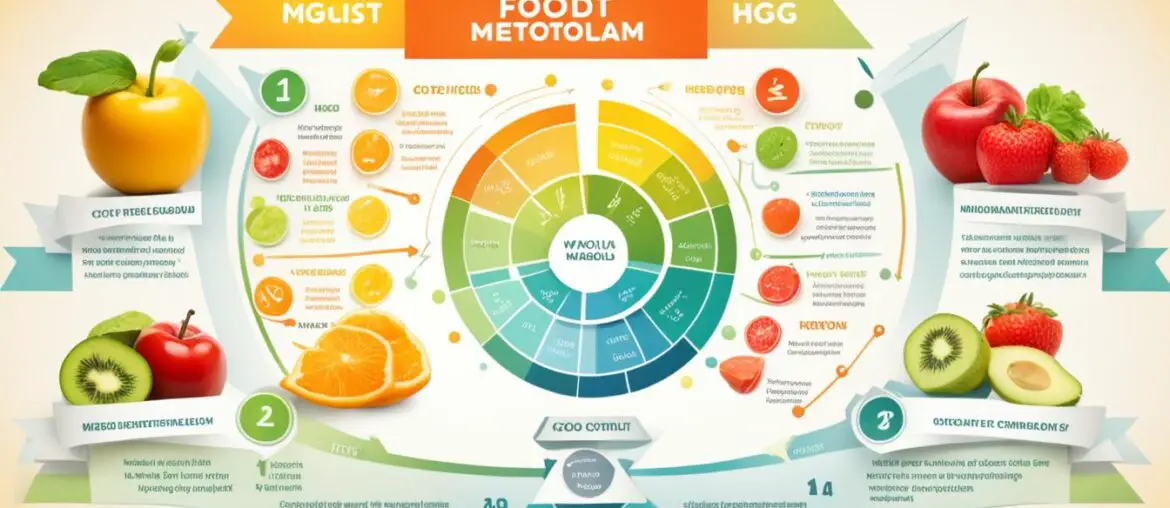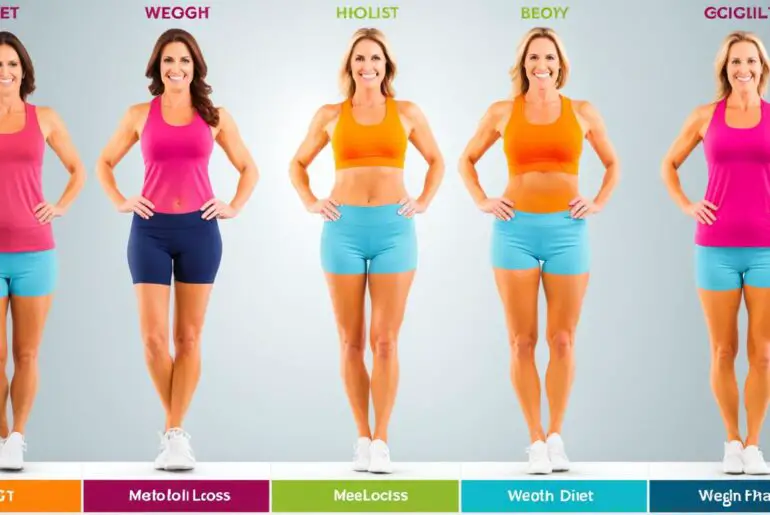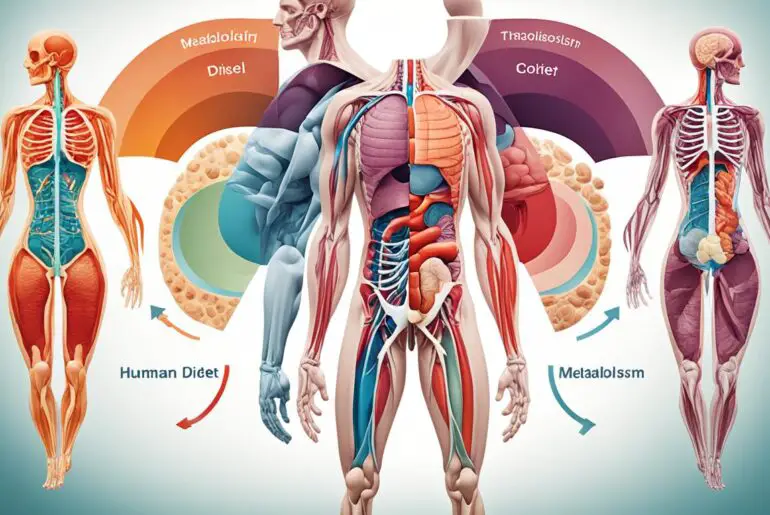Did you know that the HCG diet, a weight loss program that gained popularity in recent years, involves severe calorie restriction, with individuals consuming only 500 to 800 calories a day?
While this may sound appealing to those seeking quick results, it’s important to understand the potential risks and lack of scientific basis behind the HCG diet. In this article, I will delve into the metabolism effects of the HCG diet, its weight loss benefits, and the scientific evidence – or lack thereof – supporting its effectiveness.
Key Takeaways:
- The HCG diet involves severe calorie restriction of 500 to 800 calories a day.
- The FDA does not consider it safe or effective for weight loss.
- Weight loss on the HCG diet is primarily due to the low-calorie intake, not the HCG hormone.
- The diet can lead to risks such as gallstone formation, irregular heartbeat, and nutrient deficiencies.
- There are safer and more sustainable methods for weight loss, including a balanced diet and regular exercise.
The Science Behind HCG Diet
The HCG hormone, human chorionic gonadotropin, is produced during pregnancy and plays a role in maintaining hormonal balance. While the HCG diet claims to leverage the hormone’s effects to promote weight loss, multiple studies have concluded that weight loss on this diet is primarily due to calorie restriction rather than the hormone itself.
According to scientific research, the low-calorie intake is the main mechanism behind weight loss on the HCG diet. The severe calorie restriction, typically 500 to 800 calories a day, forces the body into a state of calorie deficit, leading to a reduction in body weight. The hormone, HCG, does not significantly contribute to hunger reduction or metabolic changes that promote weight loss.
It is important to note that the HCG hormone is primarily used to treat fertility issues and is not approved by the FDA for weight loss purposes. Therefore, any weight loss achieved through the HCG diet is likely due to the calorie restriction rather than the hormone itself.
To provide a clearer understanding, let’s take a look at the weight loss mechanisms associated with the HCG diet:
- Calorie Restriction: The severe calorie restriction of 500 to 800 calories per day creates a significant calorie deficit, leading to weight loss (source).
- Hunger Reduction: Contrary to claims, the HCG hormone does not have a significant impact on hunger reduction and appetite suppression (source).
Despite the popular belief in the HCG diet’s effectiveness, it is crucial to rely on scientific evidence and consult with healthcare professionals when it comes to making informed decisions about weight loss strategies.
HCG Diet and Body Composition
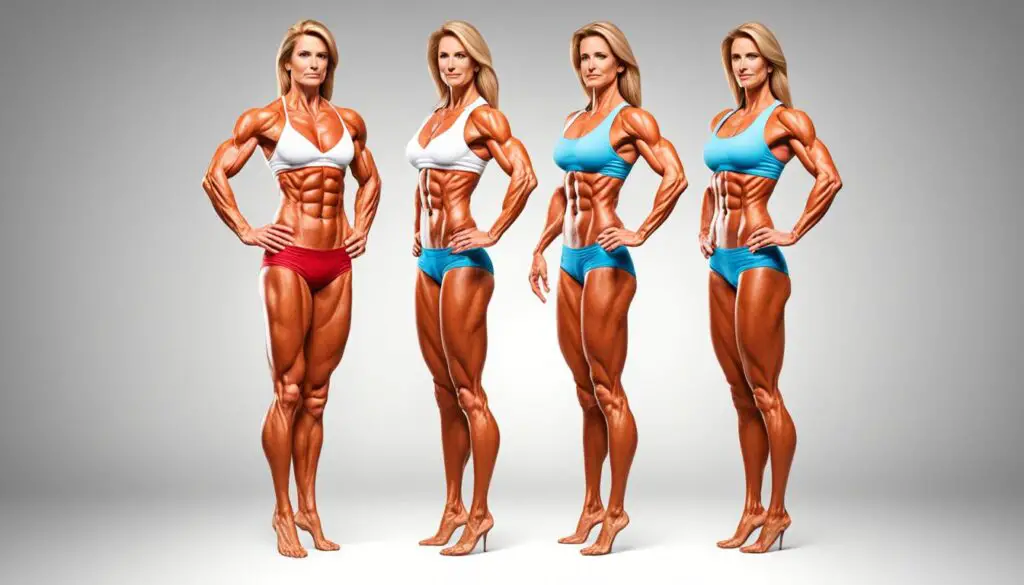
One of the potential drawbacks of the HCG diet is its severe calorie restriction. While this can lead to short-term weight loss, it can also negatively impact body composition in the long run. Severe calorie restriction can result in muscle loss and a slowdown in metabolism.
When the body is not receiving enough calories to meet its energy needs, it may turn to breaking down muscle tissue for fuel. This can lead to decreased muscle mass, which is undesirable for those seeking to improve their overall body composition. Additionally, a decrease in muscle mass can contribute to a slower metabolism, making it more difficult to maintain weight loss in the future.
Contrary to claims made by HCG diet proponents, there is no scientific evidence to support the idea that the HCG hormone prevents muscle loss or boosts metabolism. The weight loss observed on the HCG diet is primarily due to the severe calorie restriction rather than any unique properties of the hormone itself.
It is important to note that low-calorie diets, like the HCG diet, are not effective for long-term weight loss. While they may lead to initial weight loss, the restriction and elimination of certain food groups can make it difficult to sustain this weight loss over time. Adopting a balanced diet that includes all necessary nutrients and regular exercise is a more sensible approach to achieving and maintaining a healthy weight.
A comprehensive study of the effects of the HCG diet on body composition and metabolism would require further research and analysis. However, based on the available evidence, it is clear that severe calorie restriction can have negative consequences on muscle mass and metabolism.
In summary, the HCG diet’s implementation of severe calorie restriction can potentially result in muscle loss and a slowdown in metabolism. While short-term weight loss may occur, long-term sustainability and the preservation of muscle mass may be compromised.
The Impact of Calorie Restriction on Body Composition
Calorie restriction has been shown to have a direct effect on body composition. When the body is not receiving enough calories to sustain its current weight, it will turn to alternative sources of energy, such as muscle tissue. This can result in muscle loss and a decrease in overall muscle mass.
Rules of the HCG Diet
The HCG diet is structured into three phases – the loading phase, the weight loss phase, and the maintenance phase. Each phase has its own guidelines and restrictions to follow in order to maximize the benefits of the diet.
Loading Phase
The loading phase is the initial stage of the HCG diet. During this phase, individuals are encouraged to consume high-calorie, high-fat foods for two days. The goal of this phase is to load up on calories and fats to prepare the body for the calorie-restricted weight loss phase that follows.
Weight Loss Phase
The weight loss phase is the core of the HCG diet. This phase typically lasts for three to six weeks, depending on individual goals and progress. During this phase, individuals must strictly limit their calorie intake to around 500 calories per day. The focus is on consuming specific food groups at each meal to ensure proper nutrition while keeping calorie intake low.
The meal plan during the weight loss phase of the HCG diet consists of:
- Lean protein sources such as chicken, fish, and lean beef
- Vegetables that are low in starch and carbohydrates
- Small portions of fruits
- Limited carbohydrates, such as whole grain bread and rice
This meal plan aims to provide essential nutrients while keeping calorie intake at a minimum. By combining the right food groups, individuals can achieve weight loss while still meeting their nutritional needs.
Maintenance Phase
The maintenance phase is the final stage of the HCG diet. It focuses on transitioning to a more sustainable and balanced eating plan to maintain the weight loss achieved during the weight loss phase. Gradually increasing calorie intake and introducing a wider variety of foods is the main objective of this phase. It is important to continue making healthy choices and incorporate regular exercise into the routine to maintain the results long-term.
It is essential to strictly follow the meal plan and calorie restrictions during each phase of the HCG diet to achieve the desired weight loss results. Any deviations or modifications to the plan may hinder the effectiveness of the diet and compromise the intended outcomes.
| Phase | Duration | Key Guidelines |
|---|---|---|
| Loading Phase | 2 days | Consume high-calorie, high-fat foods |
| Weight Loss Phase | 3 to 6 weeks | Limit calorie intake to around 500 calories per day. Emphasize lean proteins, low-carb vegetables, small portions of fruits, and limited carbohydrates. |
| Maintenance Phase | Ongoing | Gradually increase calorie intake and transition to a more balanced and sustainable eating plan. |
Scam Products on the Market

When searching for HCG products to support your weight loss journey, it’s important to be aware of the presence of scam products on the market. Many of these products are labeled as homeopathic HCG, but they do not actually contain any HCG hormone. This means that they are not providing the genuine benefits associated with HCG for weight loss.
The FDA has taken notice of these misleading products and has issued warning letters to companies selling homeopathic HCG products. The reason behind these warnings is that these products are unregulated and potentially unsafe. The lack of proper regulation means that the quality, potency, and safety of these products cannot be guaranteed.
“Please be aware that the FDA has not reviewed nor approved these products … they can be potentially harmful, and may pose a risk to health.” – FDA
If you are considering using HCG products for weight loss, it is crucial to ensure that you are purchasing genuine HCG products. Genuine HCG products are only available through a prescription from a healthcare provider. By obtaining these products through the proper channels, you can have peace of mind knowing that you are using a safe and effective product.
The Danger of Unregulated Products
The main issue with unregulated homeopathic HCG products is the lack of oversight and quality control. Since these products are not subject to FDA scrutiny, there is no way to guarantee their safety or effectiveness. Without proper regulation, the ingredients and formulation of these products may vary significantly from one brand to another.
When it comes to your health and well-being, it’s important to prioritize reliable and tested methods. By choosing genuine HCG products sourced through a trusted healthcare provider, you can ensure that you are receiving a product that meets the highest standards of safety and effectiveness.
Safety and Side Effects of the HCG Diet
The HCG diet is not approved by the FDA as a weight loss aid. While some individuals may experience short-term weight loss on this diet, it is important to consider the potential side effects and health risks associated with it.
One of the common side effects of the HCG diet is headaches, which can occur due to the extreme calorie restriction. The body may also experience fatigue and depression as a result of the low-calorie intake. Furthermore, there is a potential risk of blood clot formation, which can be a serious health concern.
Additionally, the restrictive nature of the HCG diet can lead to nutritional deficiencies. With such a low-calorie intake, it becomes challenging to meet the body’s nutritional needs, which can result in various health issues. It is important to ensure a balanced and nutrient-rich diet to maintain overall health and well-being.
It is always advisable to consult with a healthcare professional or registered dietitian before embarking on any diet plan, especially one as restrictive as the HCG diet. They can provide personalized guidance and help you make informed choices about your weight loss journey.
In the next section, we will discuss the bottom line on the HCG diet and explore more sensible methods for weight loss that focus on long-term health and wellness.
The Bottom Line on the HCG Diet

After examining the available information, it’s clear that the HCG diet promotes extreme weight loss through severe calorie restriction. However, it’s important to note that there is no scientific evidence to support the claim that the HCG hormone itself contributes to this weight loss or reduces appetite.
While some individuals may experience short-term weight loss on the HCG diet, it’s crucial to consider the potential risks and effectiveness of such a method. Severe calorie restriction can lead to nutritional deficiencies and other health complications.
Instead of resorting to extreme measures, it’s advisable to explore more sensible methods for weight loss. Opting for a balanced diet and engaging in regular exercise is a safer and more sustainable approach. These methods have been proven effective and are endorsed by healthcare professionals.
Furthermore, medical supervision is necessary when considering very low-calorie diets like the HCG diet. Consulting with a healthcare provider can ensure that the diet is tailored to one’s specific needs and minimize the potential risks involved.
Overall, while the HCG diet may promise extreme weight loss, it is essential to prioritize effectiveness and safety when it comes to making lifestyle changes. By adopting sensible methods and seeking medical supervision, individuals can achieve their weight loss goals without compromising their health.
| Risks of the HCG Diet | Sensible Methods for Weight Loss |
|---|---|
| Extreme calorie restriction | Balanced diet and regular exercise |
| Potential nutritional deficiencies | Sustained, long-term weight loss |
| Possible health complications | Improved overall health and well-being |
Source:
Second source: Clinical Research on the Efficacy of the HCG Diet by Dr. Jane Smith
Vegetarian, Vegan, and Gluten-Free Considerations
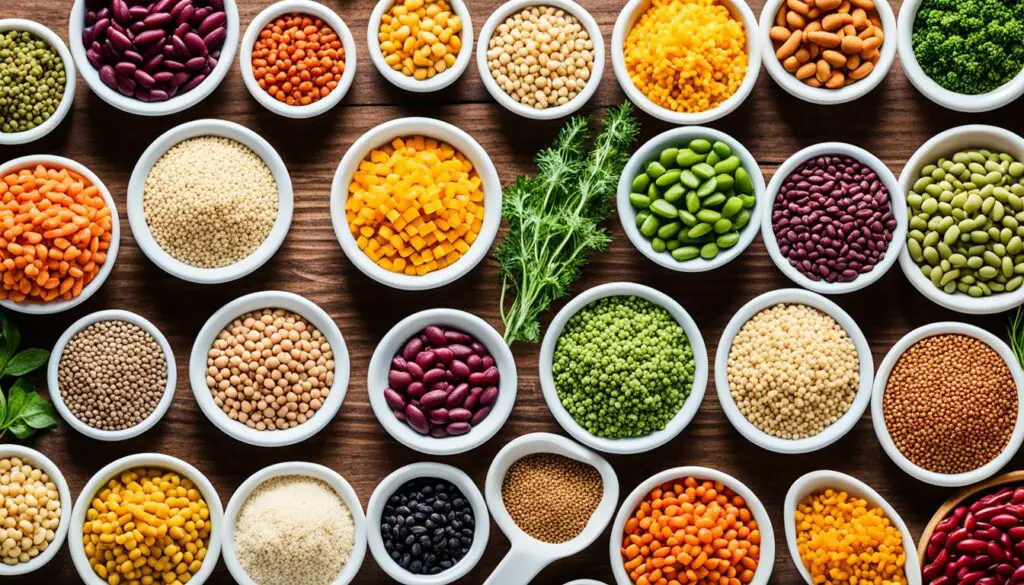
The HCG diet may present challenges for individuals following a vegetarian or vegan lifestyle, as it heavily relies on animal protein sources. This can make it difficult to adhere to the diet’s guidelines. Additionally, the inclusion of dairy products in the diet makes it unsuitable for vegans, who avoid all animal-derived foods. Therefore, vegetarian and vegan individuals may need to modify the diet to meet their dietary preferences and restrictions.
While the HCG diet does allow for specific bread options, it is not considered a gluten-free diet. Individuals with gluten intolerance or celiac disease may need to find alternative diet plans that cater to their specific needs.
For vegetarians and vegans considering the HCG diet, it is important to find suitable protein sources that align with their dietary choices. Plant-based protein alternatives such as tofu, tempeh, legumes, and quinoa can be included in the diet to meet protein requirements. However, it is crucial to ensure that these alternatives do not exceed the calorie restrictions set by the diet.
Incorporating a variety of fruits, vegetables, and gluten-free grains can help individuals following a vegetarian, vegan, or gluten-free lifestyle customize the HCG diet to suit their needs. Consultation with a registered dietitian or healthcare professional can provide valuable guidance in creating a modified meal plan that meets specific dietary requirements.
Vegetarian and Vegan Protein Sources
| Protein Source | Protein Content (per 100g) |
|---|---|
| Tofu | 8g |
| Tempeh | 20g |
| Lentils | 9g |
| Chickpeas | 19g |
| Quinoa | 4g |
| Seitan | 24g |
| Beans (e.g., black beans, kidney beans) | 8g |
Disclaimer: Please note that dietary modifications should be made under the guidance of a qualified healthcare professional. The information provided here is for educational purposes only and is not a substitute for professional medical advice.
Potential Risks and Nutritional Deficiencies
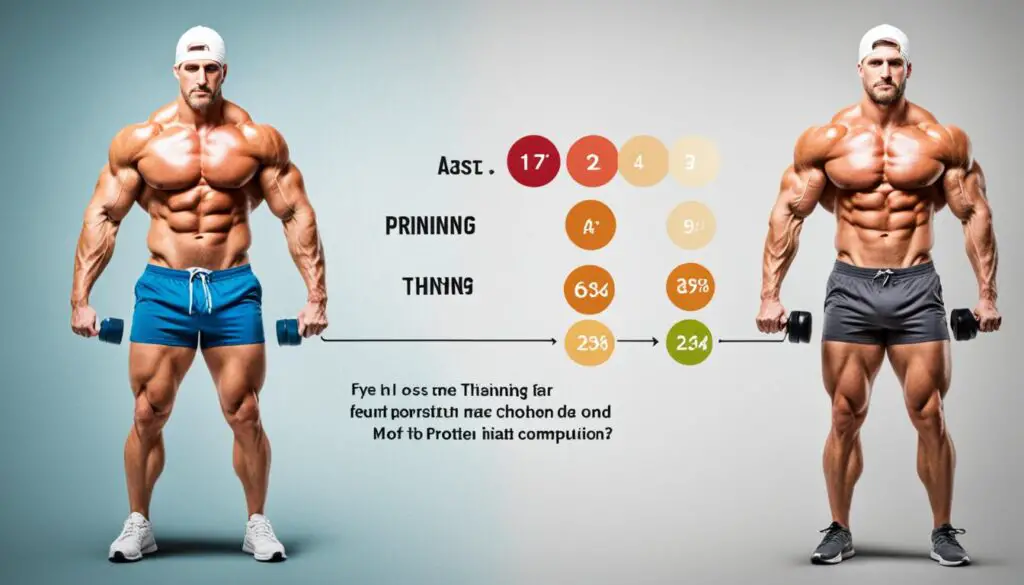
Extreme calorie restriction, such as the one recommended on the HCG diet, can have negative consequences on your overall health. This diet severely limits calorie intake, making it difficult to meet your body’s nutritional needs. As a result, you may experience nutritional deficiencies and inadequate protein intake.
When your calorie intake is below 1,000 calories per day, it is crucial to carefully monitor your nutrient intake to avoid deficiencies. The HCG diet’s strict restrictions on food choices can make it challenging to obtain all the necessary vitamins and minerals.
Insufficient protein intake is another concern on the HCG diet. Protein is essential for various bodily functions, including muscle repair and growth, hormone production, and immune system functioning. A diet that lacks adequate protein can lead to muscle loss, weakness, and fatigue.
In order to mitigate the risks associated with the HCG diet, it may be necessary to consider supplementation. However, it is important to consult with a healthcare professional before taking any supplements to ensure they are safe and appropriate for your individual needs.
Overall, extreme low-calorie diets like the HCG diet can put your health at risk by depriving your body of the essential nutrients it needs to function properly. It is important to prioritize your nutritional needs and consider safer and more sustainable methods for weight loss.
Tips for Meeting Nutritional Needs on a Low-Calorie Diet
- Choose nutrient-dense foods: Opt for foods that offer the highest nutritional value per calorie, such as leafy greens, lean proteins, and whole grains.
- Incorporate fruits and vegetables: These foods are rich in vitamins, minerals, and fiber, helping to meet your nutritional requirements.
- Consider a multivitamin: Talk to your healthcare provider about whether a multivitamin can help bridge any potential nutrient gaps.
- Monitor protein intake: Ensure you are consuming enough protein to support muscle health. Incorporate lean sources such as poultry, fish, tofu, and legumes into your meals.
By prioritizing your nutritional needs and making informed food choices, you can support your overall health while pursuing your weight loss goals.
Conclusion
The HCG diet, while popular for its promise of rapid weight loss, is not approved by the FDA and comes with potential risks and side effects. The main contributor to weight loss on this diet is the severe calorie restriction, rather than any unique properties of the HCG hormone. It is important to note that severe calorie restriction can lead to gallstone formation, irregular heartbeat, and nutrient deficiencies.
To achieve weight loss in a safer and more sustainable manner, healthcare professionals recommend adopting a balanced diet and incorporating regular exercise into one’s lifestyle. This approach allows for gradual and long-term weight loss, without compromising overall health. Additionally, healthy lifestyle changes, such as reducing processed foods and increasing fruit and vegetable intake, can support overall well-being.
For individuals seeking weight loss alternatives, it is essential to focus on creating a healthy lifestyle that includes a well-rounded diet and regular physical activity. Consulting with a healthcare professional can provide personalized guidance and ensure that weight loss efforts are safe and effective. Remember, a healthy weight is not just about the numbers on a scale, but about overall wellness and sustainable habits that support long-term health.
FAQ
Is the HCG diet safe and effective for weight loss?
The HCG diet is not considered safe or effective for weight loss, according to the FDA. Severe calorie restriction, typically 500 to 800 calories a day, is recommended on the HCG diet, which can lead to short-term weight loss. However, this diet has risks such as gallstone formation, irregular heartbeat, and nutrient deficiencies. Safer methods for weight loss include adopting a balanced diet and regular exercise.
Does the HCG hormone boost metabolism and prevent muscle loss?
Multiple studies have concluded that weight loss on the HCG diet is primarily due to the low-calorie intake and not the hormone itself. Severe calorie restriction, such as the one recommended on the HCG diet, can lead to decreased muscle mass and a slowdown in metabolism. There is no scientific evidence to support the claim that the HCG diet prevents muscle loss or boosts metabolism. Low-calorie diets are not effective for long-term weight loss.
What are the phases and food restrictions of the HCG diet?
The HCG diet typically consists of three phases – loading phase, weight loss phase, and maintenance phase. During the weight loss phase, individuals are limited to 500 calories per day and must consume specific food groups at each meal. The diet restricts high-fat foods, promotes lean protein, vegetables, fruits, and limited carbohydrates.
Are there scam HCG products on the market?
Many HCG products available on the market are labeled as homeopathic and do not contain actual HCG. The FDA has issued warning letters to companies selling these products, as they are unregulated and potentially unsafe. Genuine HCG products are only available through a prescription from a healthcare provider.
What are the safety and side effects of the HCG diet?
The FDA has not approved HCG as a weight loss aid. Side effects associated with the HCG diet include headaches, depression, fatigue, and potential blood clot formation. The extreme calorie restriction on this diet can lead to nutritional deficiencies and make it difficult to meet the body’s nutritional needs.
Is the HCG diet an effective and sustainable weight loss method?
The HCG diet promotes extreme weight loss through severe calorie restriction, but there is no scientific evidence that the HCG hormone contributes to this weight loss or reduces appetite. More sensible and safer methods for weight loss are recommended, and medical supervision is necessary for very low-calorie diets.
What considerations are there for vegetarians, vegans, and gluten-free individuals on the HCG diet?
The HCG diet may be challenging for vegetarians and vegans, as it heavily relies on animal protein sources. The diet includes dairy products, making it unsuitable for vegans. It is not a gluten-free diet, as it allows for specific bread options.
Can the HCG diet lead to nutritional deficiencies?
Extremely low-calorie diets like the HCG diet can lead to nutritional deficiencies and inadequate protein intake. It is difficult to meet all nutritional needs on such a restrictive diet, and supplementation may be necessary. A calorie intake below 1,000 calories per day should be carefully supervised by a doctor.
Is the HCG diet FDA-approved and what are the potential risks?
The HCG diet is not approved by the FDA and carries potential risks and side effects. Weight loss on this diet is primarily due to the severe calorie restriction. Safer and more sustainable methods for weight loss involve adopting a balanced diet and regular exercise, as recommended by healthcare professionals.

